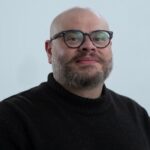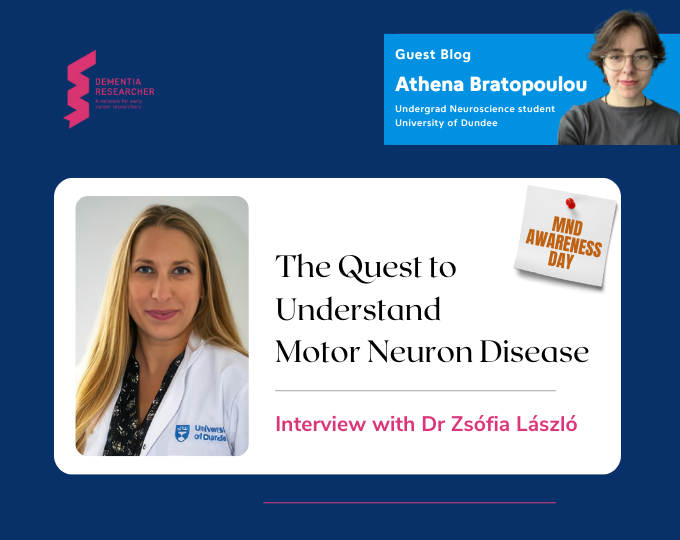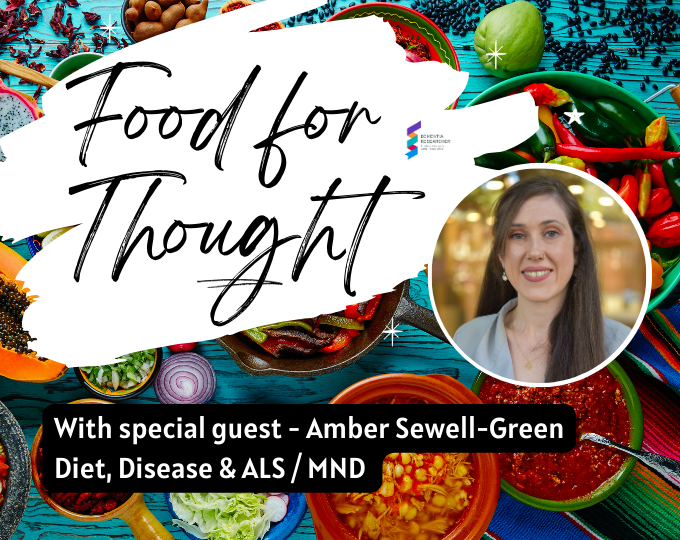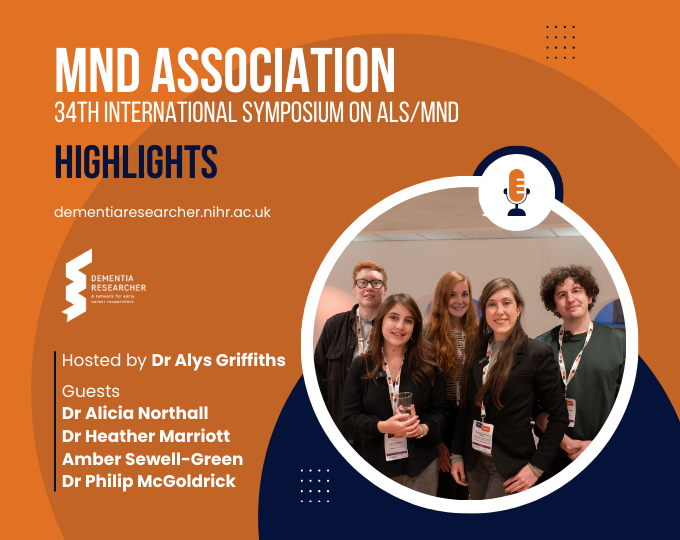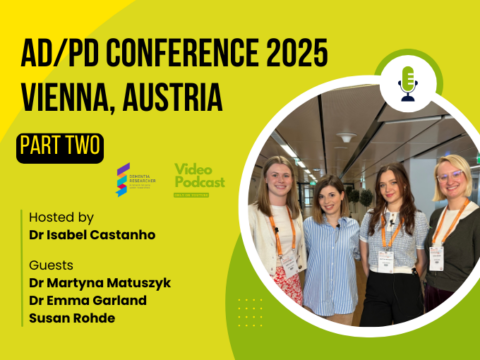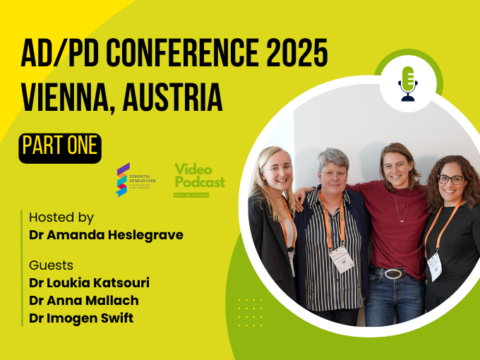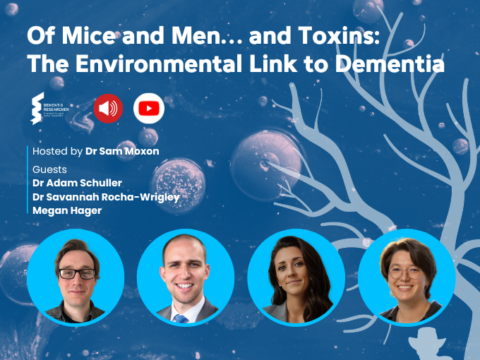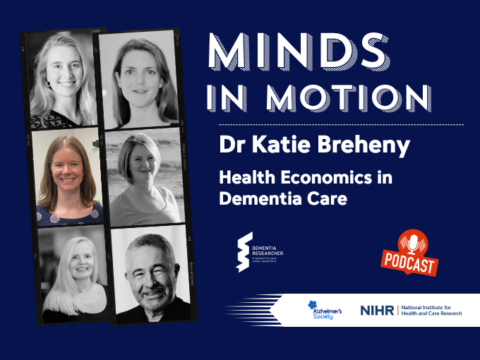In this special episode, recorded in Montreal, Canada, we bring you highlights from the International Symposium on ALS/MND 2024 organised by the MND Association. Host Dr Alys Griffiths, Senior Research Fellow at the University of Sheffield, is joined by three expert guests to discuss the latest research and breakthroughs in Amyotrophic lateral sclerosis (ALS) and motor neuron disease (MND).
Dr Megan Fowler, a postdoctoral researcher from Flinders University, shares insights into her work on endogenous retroviruses and their role in ALS. Professor Eneida Mioshi, from the University of East Anglia, explores cognitive and behavioural changes in ALS and FTD and their impact on care. Dr Ahmad Al Khleifat, a group leader at King’s College London, highlights advancements in genomic research and efforts to diversify ALS studies globally.
Key topics include promising therapies like antisense oligonucleotides, the integration of patient voices in research, and the power of collaboration to accelerate progress.
Here are 10 key takeaways:
- Collaboration Is Key: The symposium emphasised the importance of global collaboration in advancing ALS/MND research, with researchers and patient fellows working together to address diverse challenges.
- Emerging Focus Areas: A shift was noted from traditional focus areas like TDP-43 to more diverse and specific ALS subtypes, reflecting the complexity of the disease.
- Diversity in Research: Efforts to diversify genomic research and clinical trials were highlighted, with initiatives to include underrepresented populations from different ethnic backgrounds.
- Patient-Centred Approaches: Talks stressed the need to align clinical and research priorities with patient and family perspectives, especially in decision-making around therapies.
- Open Science Initiatives: New tools, like spatial transcriptomics applications, aim to foster collaboration by allowing researchers to plug in data and generate comparative insights.
- Interdisciplinary Care: Presentations highlighted the role of multidisciplinary teams in supporting decision-making, such as regarding gastrostomy, while considering patients’ and families' preferences.
- Longitude Prize Launch: A major highlight was the introduction of a large-scale, collaborative initiative aimed at accelerating drug discovery using open datasets and innovative AI methodologies.
- Antisense Therapies: A dedicated session focused on the promising role of antisense oligonucleotides in ALS treatment, with updates on their continued success in clinical trials.
- Patient Fellows' Impact: Contributions from patient fellows provided unique insights and ensured that research remains grounded in lived experiences, fostering meaningful dialogue between stakeholders.
- Continuity in Research: The event reinforced the importance of long-term monitoring and continuity in both research findings and patient updates, creating a more holistic understanding of disease progression.
Voice Over:
The Dementia Researcher podcast, talking careers, research, conference highlights, and so much more. Hello and welcome to the Dementia Researcher podcast this week. We've been in Montreal to get all the updates on the latest MMD research, so stay tuned to get our highlights from this incredible event.
Dr Alys Griffiths:
Hi, I am Dr. Alys Griffiths. I'm a senior research fellow at the University of Sheffield, and it's a pleasure to be back guest hosting this podcast again. So a few people would disagree that the key to defeating ALS lies in fostering strong collaboration between leading researchers around the world and sharing new understanding of this disease as rapidly as we can. So this was the MND Association's rationale behind the creation of the International Symposium on ALS, which this year has been taking place over the past few days here in Montreal in Canada.
So joining me on the podcast today, we have three brilliant researchers who specialise in different aspects of this field and together we're going to share and look at some of our highlights from the symposium over the past few days. So let's get on with some introductions. Joining me we have Dr. Megan Fowler from Flinders University in Adelaide, Australia, Professor Eneida Mioshi from University of East Anglia in the UK, and Dr. Ahmad Al Khleifat from King's College London, also in the UK. So hi everybody. Why don't you start by properly introducing yourselves. Megan, are you happy to go first?
Dr Megan Fowler:
Absolutely. So yeah, my name's Megan. I am a postdoctoral researcher at Flinders University. I only recently finished my PhD, so I've only been researching as a research associate for six months, but following on from some of the work that I did in my PhD so I'm in the same lab. My research focus is looking at endogenous retroviruses and their involvement in the cause and progression of motor neuron disease. And we're also looking to see if we can target endogenous retroviruses with therapeutics. So using antiretrovirals or antisense oligonucleotides.
Dr Alys Griffiths:
Great, thank you. Eneida.
Professor Eneida Mioshi:
I'm Eneida Mioshi. I'm based in Norwich. I've been in the field for quite a few years. My interest really lies into the spectrum between motor neuron disease and frontotemporal dementia. So really looking at cognitive and behaviour symptoms and how people manage that or need better management.
Dr Alys Griffiths:
Great, thank you. And Ahmad?
Dr Ahmad Al Khleifat:
Hi. I'm Ahmad. I'm a group leader at King's College London and my group is focused on optimising clinical trials and drug discovery. We try to make trials faster, better and more effective and using genomics and also big data approaches and AI.
Dr Alys Griffiths:
Fantastic, thank you. So three very different areas within the MND world. So Megan, you presented a poster.
Dr Megan Fowler:
I did.
Dr Alys Griffiths:
Would you like to tell us a bit about that please?
Dr Megan Fowler:
Of course. So yeah, my poster was looking at endogenous retroviruses in vitro model. So I wanted to try and find a cell model that we can then use to be testing therapeutics targeting endogenous retroviruses. So I looked in some common cell lines that were used in the lab and then used exogenous viral infection to induce HERV-K expression so that we can then increase expression of HERV-K to then be able to target and see if we can find any therapeutics that will reduce HERV-K. So we have found one cell model and it is induced by this exogenous viral infection that we will then be taking to the next step. So I haven't got that data yet. So far it's just sort of been focusing on validating and finding a good model for HERV-K expression and targeting.
Dr Alys Griffiths:
Great. And did you get much interest? Many questions?
Dr Megan Fowler:
I did actually. Yeah, so the previous years that I've been here, I have looked at HERV-K before, but I was previously doing it in a mouse model and this year moving to the in vitro model and what I presented this year, I've had a lot more interest in it which is really surprising. Pretty much the whole poster session that I presented, I had people coming up and talking to me and I feel like the endogenous retrovirus space is an emerging field and it is also a little bit of a controversial field and I feel like not everybody necessarily agrees that it is associated with MND. So I think that sort of gets a little bit of interest and I think the data speaks for itself, but that's a different story. But yeah, I was able to talk to a few people for quite a long time and start some collaborations, which was really good.
Dr Alys Griffiths:
Fantastic. And internationally?
Dr Megan Fowler:
Yeah, absolutely. Yeah. So everyone I talked to was either from America or the UK, so it was amazing. It should sort of...
Dr Alys Griffiths:
Well, we look forward to hearing more about that next year.
Dr Megan Fowler:
Absolutely.
Dr Alys Griffiths:
Great. And Eneida, you chaired a session?
Professor Eneida Mioshi:
Yes, I did. I chaired the session on cognitive and behavioural change, which is where we discussed lots of presentations, seven presentations actually from different parts of the world. Really good community because over the years I think you can see the growth of number of studies that now address cognitive behaviour symptoms both in the oral but also the poster sessions. So it's really nice to see there's a number of groups looking into more detail, the application of the strong criteria when people are classified. So that's really important. Professor Strong was here, so it was really lovely. And also the other change I've noticed is that I think they spot in the programme with being absolutely upgraded.
Dr Alys Griffiths:
Yes.
Professor Eneida Mioshi:
So I think it's really a reflection of how everybody's more aware and more interested and hopefully we'll be able to make some changes in how people are looked after.
Dr Alys Griffiths:
Yeah, so is that the first time that there's been a kind of FTD full segment?
Professor Eneida Mioshi:
No, not really. I think it was already a few years ago that there have been a few sessions where they have a less FTD together, and I was reflecting on that and I noticed this time the title is not FTD in general, but there's FTD throughout so many sessions. So you see in the genetics, in the pathology, in the clinical. So I think this is perhaps the evolution that it is more spread rather than needing to have one session with the name. Having said that, last year we did have a session that was specific for ALS-FTD, but I think there'd be perhaps a bit of a change depending on the year, but I think this is just great. That's more awareness and more understanding.
Dr Alys Griffiths:
So appearing in more places because people are just considering it within their larger projects.
Professor Eneida Mioshi:
Exactly. Exactly and more people from the FTD world also attending the ALS meeting, which I think it's really important, isn't it?
Dr Alys Griffiths:
Yeah. Fantastic. Thank you. Ahmad, what have you been up to?
Dr Ahmad Al Khleifat:
Yeah, quite a lot. But I think the main presentation I did is part of project mine, just the biggest genomic consortium in the world focused on ALS. And my part is involved in diversifying research in ALS. So we try to understand how people from different ethnicities face ALS in different ways. So that would help us also discover new genes, develop new methodologies around that. With every gene we discover, it becomes harder to find new gene. So we require different approaches. So far, 98% of whole genome sequencing has been done on people of European ancestry. So far we've been reaching out to other countries, clinicians from all over the world and the feedback is fantastic.
So we started some work in Africa and also in India, also in Central America. Exciting. Recently we done some Middle Eastern also work, part of Kuwait and also in Turkey. We see some new genes or genes not frequently reported in ALS in different ethnicities. For example, C9 used to be the most frequent gene, but we don't see C9 in these ethnicities. We see different genes. So it's really exciting.
Dr Alys Griffiths:
Yeah, sounds like very exciting and important work you're doing.
Dr Ahmad Al Khleifat:
Thank you.
Dr Alys Griffiths:
So you talked about diversifying clinical trials and so what are the main kind of challenges in that space at the moment?
Dr Ahmad Al Khleifat:
Trials or genomics in general. Two important aspects here would be fantastic to see also some diversity in clinical trial. We're trying to also make sure that a male and female are represented in good way on this in trials and also different ethnicities. It's really hard also to bring trials to different countries. The cost is quite high. But in general recruitment, there are different challenges. Every country have different rules and we have to respect these rules. Sometimes we need to do it locally because blood can't be shipped to the main centre and so we extract DNA, then we ship it or we provide support locally to the group there.
Most importantly, the diversity is not limited to data, it's also foreign researchers also. So we try to support researchers for all over the world so they can also develop their skills, create groups, take their own research to the next stage. And I think this is crucial.
Professor Eneida Mioshi:
Oh, can I ask a question? Actually reflecting on you saying sometimes the samples will be shipped back to the main centre, but shouldn't it be that there's an element of capacity of development for researchers in the country so that there's no need to ship anymore in future?
Dr Ahmad Al Khleifat:
I think it's the cost sequencing. To be frank, we don't have these even tools at our main centres.
Professor Eneida Mioshi:
Really?
Dr Ahmad Al Khleifat:
So we outsource these kind of tools. For example, we had a good collaboration with Illumina, the biggest sequencer in the world. So that kind of partnership is cost-effective and also minimise the bias. So sequencing machines are really expensive as you know and so it is not realistic to have sequencing machine in every centre. So I think outsourcing that could be a potential solution kind of, but we need to also sequence sometimes locally. So for example like in India, this is our approach where our aim is to help in this way.
Professor Eneida Mioshi:
[inaudible 00:10:39].Dr Ahmad Al Khleifat:
Yeah.
Dr Alys Griffiths:
Great. Thank you. So we'll move on to some highlights from the symposium.
So if anyone who is new to the highlights podcast, let me start by saying that of course we're not going to be able to cover everything that's been discussed over the past three days. There's been hundreds of talks and posters, so it just wouldn't be possible to cover everything. But what we're going to do is hear from everybody about the talks that they have seen and the posters that they've viewed that they enjoyed the most. And we'll have a little chat about those together. So Megan, can we come to you first?
Dr Megan Fowler:
Absolutely. I think one of the main themes that I've taken away from this is that there seems to have been a shift from a real focus on TDP-43. I feel like the last few years at least since I've been coming, that there's always been a TDP-43 session and everyone's sort of focusing on that cell biology. And I feel like this conference has been a little bit different and there seems to be sort of more of a diverse range of talks, which has been really interesting to hear. But a lot of them have been outside of my area of research. But it's still been really interesting to get understanding of other fields of research in ALS, which is really cool. That's obviously not a specific talking that I'm talking about, but just overall and the trend.
Professor Eneida Mioshi:
And the flavour.
Dr Megan Fowler:
Exactly. And as you mentioned before, it seems like there's more of the focus of the ALS subtypes as opposed to just everyone having a sort of broad understanding of ALS. It's sort of now ALS and FTD even within that, then the further subtyping of ALS patients, which has been cool. Obviously it makes it more difficult for clinical trials and all that sort of stuff, but I think that we're starting to see that real specificity of different ALS subtypes and how we can potentially move towards treatments and cures and that sort of stuff.
Dr Alys Griffiths:
Great, thank you. Eneida, you've hopefully brought the programme with you.
Professor Eneida Mioshi:
I did. I think there's so many interesting things as you said yourself, but I think I'm going to highlight one from this morning because I am really an applied researcher, so I think we have to wave the flag there. So for the session with this interdisciplinary care today, Sean White from the UK, he's a dietitian, so he was presenting one of his PhD studies and it is really about how the MDTs, the multidisciplinary teams helped support people in MND making decisions about gastrostomy or not. And it's really quite complex. And I think the key message, which I think... It's one challenge that we have for so many decision-making clinical therapies is that the way the professionals approach is not necessarily the way the family affected want the approach to be. So professionals have this intention to be proactive and let's get early, let's try to prevent crisis because they've seen so many before.
Whereas the family says, "Well, why do I need to talk about this? It's not even on horizon yet." And I think his key message was you need to ask permission first, if the family, the patient, they want to discuss that. So many things that professional could be discussing and there's so many priorities, but maybe be guided by what the patient or the family would like to go and just check in the preparation and if it's there, then go into these complex decisions. But I think what is really invigorating is having more like health professionals present here showing their research. And I think this is really important for the symposium and I'm so delighted.
Dr Alys Griffiths:
Yes. So I'm biassed because I'm from the same research group as Sean, but I also thought that was fantastic. And I guess, yeah, that kind of patient-focused approach of helping us to think about what the person, the family wants and not assuming that based on our experience that we know what's right.
Dr Ahmad Al Khleifat:
And that also could be part of optimising trials because optimising these outcomes and with help of people with MND, I think it's really caution. So it's really hard to measure sometimes what's good faith that is, but quality life is important. It's not just survival, a high [inaudible 00:14:58], and that we need to work closely with everyone and to make sure that that could be delivered in a better way.
Professor Eneida Mioshi:
Exactly. Sometimes I guess the question is for them, is it about longevity or the quality, isn't it? And families have to participate in that decision, yeah.
Dr Alys Griffiths:
Around quality versus quantity of life and how how that might change over time. Great. Ahmad, would you like to give us a highlight for you?
Dr Ahmad Al Khleifat:
The highlight is the launch of a Longitude Prize and then the initial opening ceremony. I think it was fantastic idea to bring large data sets, open these large data sets for everyone and also create support system to make people, data scientists, geneticists, work with biologists for drug discovery and bringing this as a consortium in a slightly competitive way, almost like a five-year hackathon style. Who going deliver the first drug to clinical trial that will be proposed like a million pounds. And that's really exciting. Longitude Prize has long history and I think the main idea was it was open this data set to everyone and see who can help. So we can't say that we are the custodian of this data set or we're all the best statistician. Once you open this data set to everyone, you don't know what you're going to find. And I think this is fantastic. Science is about working in a collaborative way and I think this is the way forward.
Dr Alys Griffiths:
So that feels something that's quite new in this kind of space.
Dr Ahmad Al Khleifat:
We do a lot of collaboration between data science, but I think working geneticists or biopharmaceutics usually work in isolation from our biologists. And I think this is a combination of both. So first phase is data science heavy, the second phase is validation in user and using in vivo and vitro style. And I think this is the unique aspect, the second unique aspect using AI and cutting edge methodology in drug discovery. And I think it takes to the boxes from using novel methods and also data sharing and I think it's a logical next step, but providing funding for this is crucial.
Dr Alys Griffiths:
So bringing people together from hopefully around the world to...
Dr Ahmad Al Khleifat:
Yeah. Yeah, although it's UK, it started from UK and I think it's international also initiative. Yeah.
Dr Alys Griffiths:
Yep. Fantastic. So Megan, coming back to you, so another highlight that you'd like to share.
Dr Megan Fowler:
Yeah, there was one talk that I saw yesterday afternoon, I think her name was Stephanie Howe from University of Queensland. And just after saying before that there hasn't been as much focus on TDP-43, this one was looking at spatial transcriptomics in a TDP-43 mouse model, which is really interesting. And on that sort of collaborative effort, at the end she mentioned that she's hoping to create this application where you can plug in your protein of interest and then also come up with a map of how that relates to what she's found as well, which I think is really cool because sort of opening up that collaborative effort and we can all sort of have the same tools to get to the same point, if that makes sense. So yeah, that one was really interesting and she is also a PhD student, so I think that's amazing effort to get up and talk as a PhD student, she did really well. Yeah, absolutely.
Professor Eneida Mioshi:
So it feels like a big open science kind of underpinning of all sorts of things that people are talking about.
Dr Megan Fowler:
Absolutely. I feel like for a disease like ALS where there's just so much complexity, that that is probably how it's going to be, how you're going to be finding the treatments.
Dr Alys Griffiths:
Great, thank you. Eneida, you got another highlight in that programme.
Professor Eneida Mioshi:
I do. I think it's related to actually things you both have said. So this was Cassandra Haddad. She's a gene carrier and she was on the session on presymptomatic detection and early diagnosis and she spoke as a GD carrier but she's also a nurse in her job and she was sharing the challenges, trying to participate in trials, the personal cost and she was very brave in sharing how actually hard it is. She was very personal too, but so passionate. And I met all the, how they called the Patient...
Dr Alys Griffiths:
The Patient Fellows.
Professor Eneida Mioshi:
That's it.
Dr Ahmad Al Khleifat:
Yeah.
Professor Eneida Mioshi:
I met a few more. I spoke to Mindy as well. I spoke to Paul and his Matthew and it was really interesting because them being here and the types of questions they make, I think it's fantastic because they have the courage to go and say what they're really thinking and challenging the researchers but also at the same time contributing and making sure we stay tuned to what is important. And of course I need to put a little flag for Sue Hill who came with me. So she's a former carer and she's also being very much involved in our researchers. This is the first time she joined to see how the research community is and how the work is going and comparing her personal experience 20 years ago and seeing now how FTD is pervasive. So I think having people like that present together with the scientists, it's what makes things meaningful I think.
Dr Ahmad Al Khleifat:
Yeah. I think Cassandra have been doing really fantastic work and all research fellows, so part of UK MND Institute research fellows actually were the driving force to creating all this collaborative work to create the institute and now they are part of also them in the committee. So grants are reviewed also by Patient Fellows. They provide feedback and I think this is really critical to start from the beginning rather than feedback towards the end of finishing the studies. And then back to what Cassandra was highlighting also about prevention and pre-symptomatic areas. And I think we need to develop a method of how we could communicate science in a more effective way, reaching out, receiving this feedback and involving everyone in this because prevention probably our only solution or a good solution to start with, yeah.
Dr Alys Griffiths:
And I think it's really interesting how researchers need to ensure that their messages are able to be understood by the wide range of audience members here, which includes people living with ALS, family members, researchers from that area, and also researchers who work in completely different areas. So it feels like a challenge but one that people have very much taking on and that's led to them having lots of different types of questions.
I don't know if anybody was at the breakfast session yesterday, but there was a man who talked about his diagnosis experience and that for me was probably the highlight because he talked about how he had symptoms, but actually he was 38 and his symptoms were related to his hobby. So he was noticing that he wasn't making the progression in weightlifting that he would expect, but actually from a kind of healthcare professional, it's not something that would be picked up because his lower limbs weren't affected.
He was walking well, but actually it was his kind of grip strength and forearms that were affected and he was noticing it because he was doing so many bicep curls, but it wouldn't necessarily be picked up and it wasn't coming up on the scans and...
Professor Eneida Mioshi:
So young as well.
Dr Alys Griffiths:
Yeah, and he just gave I guess a really powerful kind of message around if healthcare professionals aren't listening to you and you know something is wrong with your body, just keep pushing it. So it felt like a really, quite an emotional talk, but just as you've said about the other person so brave to be willing to get up in front of all of these strangers to talk about your personal experiences.
Dr Ahmad Al Khleifat:
Yeah, I think it's important for researcher also to meets people with MND and I think one approach we've done at King's that new PhD students, new researchers will attend the clinic. So we'll show the clinician and you can see variation and also progression in the clinic from new diagnosis to the... And this is really important because when you're studying a [inaudible 00:24:09] condition, it's very heterogeneous. Like we mentioned, sometimes will start, it's not usually the gait and movement usually, sometimes a simple task like holding key or dropping. So when its starts is really important. That could lead us to understand risk in different ways. And also back also having male and female do different. Also like women, their clinical picture. I think centres should adopt that more active engagement with people with MND from the beginning. Yeah.
Professor Eneida Mioshi:
I think the charities, both MND Association, MND Scotland, they have events where they're bringing together to ensure, encourage PhD students and others to present and also meet people affected by MND. And I think the MND Association one is called EnCouRage.
Dr Ahmad Al Khleifat:
Yeah, yeah. And honestly they are really fantastic and they are personal friends talking with him.
Professor Eneida Mioshi:
He keeps it real, doesn't he?
Dr Ahmad Al Khleifat:
Yeah, yeah. I think don't be shy, just reach out. Yeah.
Dr Alys Griffiths:
And I think maybe that way of working isn't known around the world and that's something that we should share more widely.
Dr Ahmad Al Khleifat:
Oh, good point.
Professor Eneida Mioshi:
Absolutely. I think the countries, I come from South America and I think the relationship, it is still evolving, but I think there's this professional authority versus the patient or the scientist and the research participant. Whereas in the UK definitely it's very blurred and there's a bigger push in ensuring those affected actually having a voice in grant making, in designing, in how methods are applied, how long things are, how fatigued people may be and how to communicate the findings.
Dr Ahmad Al Khleifat:
Yeah, I think we could learn a lot. We should be humble because we can't progress. And also that stereotypical image of doctor that knows everything is gone. We shouldn't be shy to search and communicate and admit where we can.
Dr Alys Griffiths:
So has anybody got one last highlight before we wrap up?
Dr Megan Fowler:
I have. This is more specific to my work, but I thought the whole session on antisense oligonucleotides was really cool. So I think this might be the first year where they've had a whole session dedicated to that therapy and I thought that was really interesting. I don't know if you guys remember from last year, but there was the antisense oligonucleotide therapy targeting fuzz that was used in endocrine study where the patient actually walked onto stage at the end of the conference last year. And I thought that was amazing, seeing that. I thought that was really cool. And so that was sort of followed up in that session this year and it was just cool to see that that patient is still progressing in a positive way, which is really cool.
And obviously this is a bit biassed towards my work. I'm going into the antisense space. So yeah, it was really interesting to get some of those more molecular understanding of the AOs and how they're working in these studies at the moment.
Dr Alys Griffiths:
I think you've raised some really important though around continuity and you hear so much information when you're here, when you hear from individual patient, fellows and carers and people living with MND who are sharing their experiences and then you might never see them again.
Dr Megan Fowler:
Exactly.
Dr Alys Griffiths:
But actually being able to have that continuation and hearing about them.
Dr Megan Fowler:
For sure, yeah.
Dr Alys Griffiths:
That's really special.
Dr Megan Fowler:
Absolutely. That's cool.
Dr Alys Griffiths:
Thank you. And anyone last highlight?
Professor Eneida Mioshi:
No, I think I'm good.
Dr Alys Griffiths:
You're all out of highlights. Great. Ahmad, anything final?
Dr Ahmad Al Khleifat:
Probably I saw biomarker work and I love the idea of different proteins also involved in ALS and like you mentioned also TDP-43 is very important, but we see also different genes, different proteins involved which could cause different conditions. So how one gene can cause different also condition and why I think we saw some good work in biomarker like how to connect some of these stuff together.
Dr Alys Griffiths:
So you feel like people from around the world are kind of doing bits of different dots and then here you're able to actually put in the whole picture and get an understanding outside of your field as to where we are in the space that way.
Dr Ahmad Al Khleifat:
This is the ideal. It's not just seeing, also communicating. So now I know she work in retroviruses, I work also in retroviruses.
Dr Alys Griffiths:
Amazing. Forming connections on the podcast.
Dr Ahmad Al Khleifat:
At Kings we manage to reach this phase three clinical trial for antiretroviruses.
Dr Megan Fowler:
Oh, amazing.
Dr Ahmad Al Khleifat:
So we are doing this also cooperating with Australia.
Dr Megan Fowler:
Is that with the Lighthouse trial?
Dr Ahmad Al Khleifat:
Yeah.
Dr Megan Fowler:
Yeah, yeah.
Dr Ahmad Al Khleifat:
Yeah. So it was actually the connection with retroviruses discovered that case by Ammar Chalabi probably 12 or 15 years ago and that was really conservative. But seeing that reaching clinical trial at phase 3...
Dr Megan Fowler:
Absolutely.
Dr Ahmad Al Khleifat:
It's fantastic. And we tried to develop biomarker for this, so maybe we could reach out.
Dr Megan Fowler:
Absolutely. Let's talk.
Professor Eneida Mioshi:
You're having to recognise your postdoctoral visit. And who show up.
Dr Ahmad Al Khleifat:
Fantastic.
Dr Alys Griffiths:
Thank you all so much. Sadly, that's all we have time for today. However, if you'd like to see more from this event, there are lots of posts on social media. Take a look at #ALS MND Symposium on both X and Bluesky and you can also visit the event website, which is symposium.mndassociation.org. I would just like to say thank you to my brilliant guests, so Megan, Eneida, and Ahmad, and of course the MND Association for making all of this possible. My name's Alys, and you've been listening to the Dementia Research podcast.
Voice Over:
The Dementia Researcher Podcast was brought to you by University College London with generous funding from the UK National Institute for Health Research, Alzheimer's Research UK, Alzheimer's Society, Alzheimer's Association, and Race Against Dementia. Please subscribe, leave us a review and register on our website for full access to all our great resources, dementiaresearcher.nihr.ac.uk.
If you would like to share your own experiences or discuss your research in a blog or on a podcast, drop us a line to dementiaresearcher@ucl.ac.uk
Did you know... you can find our podcast in your favourite podcast app on mobile devices, and our narrated blogs are also available as a podcast.
The views and opinions expressed by the host and guests in this podcast represent those of the guests and do not necessarily reflect those of UCL or Dementia Researcher

 Print This Post
Print This Post


